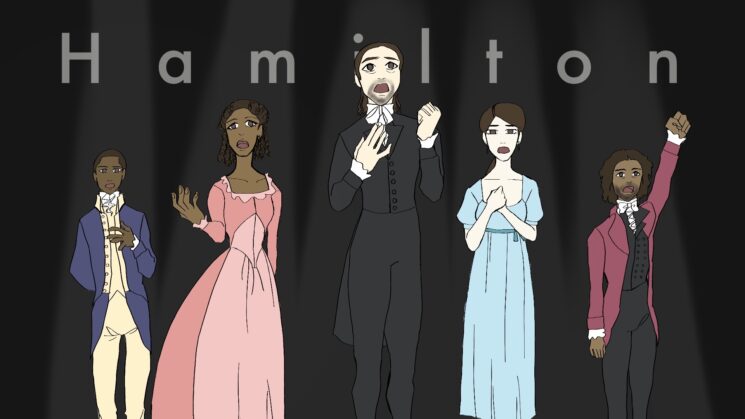
By Rebecca Do
In 2015, a single two-hour and 45-minute play took the nation by storm. Its classic Lin-Manuel Miranda charm captivated audiences worldwide, and this was further amplified when a filmed version of the play, Hamilton was released on Disney+ two years ago on July 13.
I took it upon myself to watch almost all three hours of this all-American play this week. The music was there, for sure. Every now and then I found myself bopping my head to the musical genius of Miranda; his habit of making mini-reprises and strong orchestral melodies captivated me.
My personal favorite songs in the play were “The Schuyler Sisters” and “Burn” (which has nothing to do with the fact that the sisters were my favorite characters in the play). I was in love with Philipa Soo’s performance as Elizabeth Schuyler-Hamilton, and I believe she captured the role of the devastated wife beautifully.
I cried with Burr (Leslie Odom Jr.), I emphasized with Angelica (Renee Elise Goldberg) and I grieved with Washington (Christopher Jackson). Never in my life had I felt so connected to a historical feature. Miranda did an amazing job of romanticizing the history of the Revolutionary war and of Alexander Hamilton’s internal, more personal, scandalous affairs; take that as you will, positive or negative.
Other than the music, which was ingenious, Hamilton has been hailed for the most part, for one thing– diversity. Miranda made waves when he made most of the cast of non-white actors, encouraging non-white people to audition for roles.
Diversity is welcomed and inclusivity in arts is so important, but is casting black people to play slave owners the best you could do, Miranda?
From a modern lens, the founding fathers were notoriously terrible people. Jefferson impregnated an enslaved child (more than once). Washington refused black people in his army during the Revolutionary war until he decided it was beneficial to the cause. Hamilton, the show’s namesake, wasn’t as righteous a person as you’d expect.
Even though having a black person play Washington or Madison may seem like a revolutionary act that has never been done before, is it really revolutionary if you’re casting a black person as their oppressor?
When you’re casting these actors to play roles of terrible white people, it can project the notion that black folks, back in the day, could have the ability to do that too.
That notion is why historical literacy is so important when it comes to modern historical media.
People should come into Hamilton knowing that these characters weren’t black, that American history was notoriously exclusionist towards African-Americans and that Hamilton as a show is a double-edged sword; beautifying the theatre world by showcasing a diversity that history has never seen before, yet hiding the most disturbing parts of American history with a shield of “diversity.”





